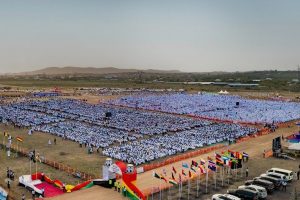
Qasim Choudhary, Canada
Love, the cornerstone of all relationships. An expression that transcends all barriers and a language, which is universal, yet, some of us may struggle to communicate this language to our loved ones, leading to failed and unhappy relationships. Dr. Gary Chapman, in his widely celebrated book,The 5 Love Languages, claims that every person understands and receives love in a specific language – one of five to be precise. According to Dr. Chapman, understanding a person’s love language is essential in strengthening your bond. Leafing through this book, I was curious to know if the Holy Prophet (sa) ever spoke these languages? What was his approach in achieving a healthy balance in all his relationships? After all, it was the Holy Prophet (sa) who said, ‘The best of you is the one who is best to his wife, and I am the best of you to my wives.’ [1] But what are these love languages? And did the Holy Prophet Muhammad (sa) ever apply these in his own life?
(1) Words of Affirmation
‘I can live for two months on a good compliment’ [2]– Mark Twain
People who adhere to this love language need to hear words of kindness, encouragement and appreciation. Hearing ‘I love you’ or even ‘thank you’ can fill the emotional tank of your partner and fuel the flames of love. The Holy Prophet (sa) understood the positive impact of such words of affirmation. When asked whom he loved most amongst the people, he did not hesitate to say, ‘Aisha!’, the third wife of the Prophet (sa) and daughter of his closest companion, Hazrat Abu Bakr (ra). [3] Imagine how elated Hazrat Aisha (ra) must have been after hearing such high praise from her noble husband.
It is easier to remark a person’s admirable qualities when they are present, but praising them long after they have departed is testament to true love. This honour was held by Hazrat Khadija (ra), the first wife of the Holy Prophet (sa), whom he greatly revered and frequently complimented calling her ‘the best amongst the women of her nation’. [4]
Infidelity or even rumors of unfaithfulness can be devastating to a relationship. Naturally, this would raise a wave of emotions and distrust. Suspicion could creep in, ultimately severing the once existing bond. Yet, the Holy Prophet (sa) found a way to compliment Hazrat Aisha (ra) even when her innocence was being questioned. His powerful statement, ‘I have never known anything bad about her’, acted as a citadel against those who falsely slandered her, and it also provided her much-needed solace.[5] From this, it becomes glaringly evident how powerful a tool verbal compliments can be in fostering a successful relationship. It may take some effort and time to make this an everyday habit. But instead of taking it as a waste of time, think of it as an investment of your time, which happens to be the second love language.
(2) Quality Time
It can be a matter of great annoyance when trying to communicate with a loved one, who is glued to their cell phone. We all crave undivided attention, because it is a powerful, emotional communicator of love. An activity done together acts as a vehicle to togetherness. Dr. Chapman explains that the activity itself is incidental, but the focused time shared together is of true value. The Holy Prophet (sa) recognized the emotions that are created in spending time together. He would engage in different activities to bolster his connection with his partners. Once on the occasion of Eid, there were people displaying their skills of archery, spear fighting and sword fighting. Knowing that Hazrat Aisha (ra) would find this show amusing, he took her along with him to see the performance. Together, they enjoyed the entertainment and more importantly, the Holy Prophet (sa) ensured Hazrat Aisha (ra) was fully satisfied and did not rush the moment. She continued to watch, leaving on her own accord. [6] Whether it be a leisurely stroll or travelling, the Holy Prophet (sa) meticulously invested quality time with all his wives, maintaining a delicate balance. [7] [8] He made it a point to drop by to see each wife every day in order to tend to their needs. [9] He gifted his loved ones with the intangible gift of self and presence, which brings us to the third language of love.
(3) Receiving Gifts
‘Give gifts and you will love one another.’ [10] – The Holy Prophet (sa)
Dr. Chapman reveals that of all cultures he studied, gift giving was a central theme in the love marriage process. A fundamental expression of love that transcends cultural barriers. At first glance, this particular love language may seem selfish on the part of the receiver. However, it must be remembered, the gift itself is of less importance. What truly matters, is the feeling when holding a gift. It gives rise to a sense of importance and remembrance. It is not the gift which is necessarily cherished, rather, the effort in actually securing the gift and giving it as an expression of love. A child who picks out a flower from the garden and hands it to his mother, or the husband who picks out wildflowers alongside the road for his wife, are both powerful expressions of love. Although the cost of picking out flowers is zero, it is an invaluable, visual symbol of love. The Holy Prophet (sa) was cognizant of the fact that the expression is greater than the actual gift. This can be demonstrated through the following narration:
The Holy Prophet (sa) said, ‘I shall accept the invitation even if I were invited to a meal of a sheep’s trotter, and I shall accept the gift even if it were an arm or a trotter of a sheep.’ [11]
The blessed personage of the Holy Prophet (sa) was not one of ostentation or extravagance. He was an embodiment of simplicity and so too were his wives. They never expected or demanded materialistic things from him. In fact, in that age, food and drink were considered a valuable commodity. Hazrat Aisha (ra) narrates that once beef was brought to her and she asked, ‘What is this?’ The people replied, ‘Allah’s messenger has slaughtered some cows as sacrifices on behalf of his wives.’ [12]
Gifts come in all shapes and sizes. The cost of the gift matters little, even a small handmade gift can strike a chord in the heart of a loved one. It is the effort and action, which takes a special place in the heart. This leads us to the fourth language of love.
(4) Acts of Service
Any act, which results in unloading a burden from your partner, can be deemed as an act of service. This can range from doing household chores to going the extra mile to show your partner you really care. This requires thought, effort, planning and energy. Executed in a positive spirit, they can be a great expression of love. The attitude of the Holy Prophet (sa) perfectly encapsulates this language. With regards to chores, the Holy Prophet (sa) played an instrumental role and took part in household chores. He mended his sandals and garments and milked his goat. He would occupy himself in serving his family. [13] These actions of the Holy Prophet (sa) obliterate the common stereotype held in some parts of the world where women are treated as doormats, who are to be stepped on and treated as a servant and not a partner.
The Holy Prophet (sa) broke away from the commonly held stereotypes and always met the emotional needs of his spouses. Hazrat Aisha (ra) lost her necklace on more than one occasion. Instead of scolding her and reprimanding her, the Prophet (sa) immediately set his sights on recovering the missing necklace. He would stop the entire caravan to look for the necklace, thus, displaying his deep affection for her. [14]
Acts of service require us to transmit our energy into certain endeavours we may not want to do. It demands that we utilize our physical faculties to our level best, to bring comfort to our kith and kin. This brings us to our last love language.
(5) Physical Touch
Research shows that children who are deprived of physical touch, exhibit impaired growth and cognitive development. [15] Babies who are held, hugged, and kissed, develop a healthier emotional life. However, the importance of touch is not a modern idea. Upon being asked if he had ever kissed his children, the Holy Prophet (sa) replied in the affirmative. But when the questioners said that they do not kiss their own children, the Holy Prophet (sa) replied, ‘Then what can I do if Allah has deprived you of mercy?’ [16]
According to Dr. Chapman, physical touch is also a powerful vehicle for communicating marital love. Without it, some may feel unloved. With it, they feel secure in the love of their spouse. On one occasion, Hazrat Aisha (ra) complimented the Holy Prophet (sa). Overjoyed with emotions, he kissed her forehead and said, ‘Your delight could not have been as much as the delight you have given me!’ [17]
Physical touch communicates love or hate. For some, it sends a louder message than words. When we are upset with someone, we refuse to shake their hands or greet them cordially. Holding or caressing may seem trivial to some, however, the Holy Prophet (sa) recognized the emotional impact touch has. Hazrat Aisha (ra) relates that the Holy Prophet (sa) would rest his head on her lap. [18]
The manner in which the Holy Prophet (sa) treated women, children, and people in general was revolutionary for its time. He lived in a society void of love. As a matter of fact, the people had forgotten how to love. Hazrat Umar Farooq (ra) reflected, ‘In Makkah, we despised women as lowly creatures. In Madinah, the people accorded slight status to them, but when Islam arrived, we were made aware of the honour and status of women.’ [19]
It was ultimately the power of love that shook the divine throne, drawing the angels to a nation that became enamoured with an orphan, who did not even get to fully experience the love of parents. The world has only recently begun to understand the psychology behind healthy relationships. Advice given today by marriage counselors was put into practice over 1400 years ago by the Holy Prophet (sa). Emulating his pristine example, we all can become embodiments of true love, for he spoke all the languages of love.
About the Author: Qasim Choudhary is a recent graduate from the Ahmadiyya Institute of Languages and Theology in Canada.
ENDNOTES
[1] Ibn Majah Kitab Nikah vol 3 book 9 hadith 1977
[2] Mark Twain (2013). “Delphi Complete Works of Mark Twain (Illustrated)”, p.9066, Delphi Classics
[3] Bukhari, Kitabul-Maghazi, Bab Ghazwa Dhat-us-Salasil
[4] Bukhari, Kitab Manaqib-ul-Ansaar, Bab Tazweej-un-Nabi Khadija wa Fazliha
[5] Bukhari, Kitabul-I’tisaam Bil Kitaab wal Sunna
[6] Bukhari, Kitab Nikah, Bab Husnul Muaashira Ma’al Ahli
[7] Ibn Majah, Kitab Nikah
[8] Bukhari, Kitab-ul-Shahadat Bab Tadeel-e-Naas Badhina Badan
[9] Muttaher ‘Aeil Zindagi, pg.125
[10] Al-Adab Al-Mufrad, Kitab Tasaruf Alaam, Bab Qabulil Hadiya
[11] Bukhari, Kitab Al-Hubatu Wa Fadhluha Waltahreedh Alaiha
[12] Bukhari, Kitab Al-Adaahi
[13] Bukhari, Kitabul Adhan
[14] Bukhari, Kitab Fadhail Ashaab, Bab Fazli Aisha
[15] Frank DA, Klass PE, Earls F, Eisenberg L. Infants and young children in orphanages: One view from pediatrics and child psychiatry. Pediatrics. 1996;97:569–78.
[16] Musim, Kitaab Fadhail, Bab Rahima Sibyaan Wal Iyaal
[17] Madarij-ul-Salikeen, Imam Ibn Qayyim p.177
[18] Ibn Majah, Kitab, Atahirah wa Sunnuha
[19] Bukhari, Vol.1, p.869




Add Comment